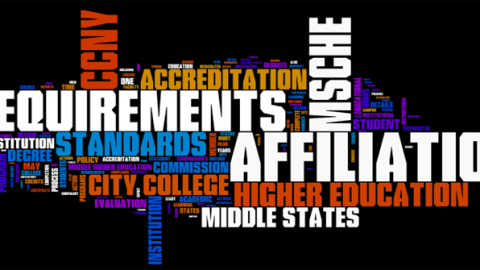Requirements for Affiliation
To be eligible for, to achieve, and to maintain accreditation from the Middle States Commission on Higher Education, an institution must demonstrate that it fully meets the following Requirements of Affiliation. Compliance is expected to be continuous and will be validated periodically, typically at the time of institutional self-study and during any other evaluation of the institution’s compliance. Once eligibility is verified, an institution then must demonstrate that it meets the standards for accreditation.
Alignment of the Standards of Accreditation and the Requirements of Affiliation
The institution is authorized or licensed to operate as a postsecondary educational institution and to award postsecondary degrees; it provides written documentation demonstrating both. Authorization or licensure is from an appropriate governmental organization or agency within the Middle States region (Delaware, the District of Columbia, Maryland, New Jersey, New York, Pennsylvania, Puerto Rico, and the U.S. Virgin Islands), as well as by other agencies as required by each of the jurisdictions, regions, or countries in which the institution operates. Institutions that offer only postsecondary certi cates, diplomas, or licenses are not eligible for accreditation by the Middle States Commission on Higher Education.
The institution is operational, with students actively pursuing its degree programs.
For institutions pursuing Candidacy or Initial Accreditation, the institution will graduate at least one class before the evaluation team visit for initial accreditation takes place (Step 7 of the initial accreditation process), unless the institution can demonstrate to the satisfaction of the Commission that the lack of graduates does not compromise its ability to demonstrate appropriate learning outcomes.
The institution’s representatives communicate with the Commission in English, both orally and in writing.
The institution complies with all applicable government (usually Federal and state) policies, regulations, and requirements.
The institution complies with applicable Commission, interregional, and inter- institutional policies. These policies can be viewed on the Commission website, www.msche.org.
The institution has a statement of mission and goals, approved by its governing body, that defines its purpose within the context of higher education.
institution systematically evaluates its educational and other programs and makes public how well and in what ways it is accomplishing its purposes.
The institution’s student learning programs and opportunities are characterized by rigor, coherence, and appropriate assessment of student achievement throughout the educational offerings, regardless of certi cate or degree level or delivery and instructional modality.
Institutional planning integrates goals for academic and institutional effectiveness and improvement, student achievement of educational goals, student learning, and the results of academic and institutional assessments.
The institution has documented nancial resources, funding base, and plans for nancial development, including those from any related entities (including without limitation systems, religious sponsorship, and corporate ownership) adequate to support its educational purposes and programs and to ensure nancial stability.The institution demonstrates a record of responsible scal management, has a prepared budget for the current year, and undergoes an external nancial audit on an annual basis.
The institution fully discloses its legally constituted governance structure(s) including any related entities (including without limitation systems, religious sponsorship, and corporate ownership). The institution’s governing body is responsible for the quality and integrity of the institution and for ensuring that the institution’s mission is being carried out.
A majority of the institution’s governing body’s members have no employment, family, ownership, or other personal nancial interest in the institution. The governing body adheres to a con ict of interest policy that assures that those interests are disclosed and that they do not interfere with the impartiality of governing body members or outweigh the greater duty to secure and ensure the academic and scal integrity of the institution. The institution’s district/system or other chief executive officer shall not serve as the chair of the governing body.
The governing body/bodies are prepared to demonstrate in writing, as may be required, that the institution will make freely available to the Commission accurate, fair, and complete information on all aspects of the institution and its operations. The governing body/bodies ensure that the institution describes itself in identical terms to all of its accrediting and regulatory agencies, communicates any changes in accredited status, and agrees to disclose information (including levels of governing body compensation, if any) required by the Commission to carry out its accrediting responsibilities.
The institution has a core of faculty (full- time or part-time) and/or other appropriate professionals with sufficient responsibility to the institution to assure the continuity and coherence of the institution’s educational programs.
*Excerpted from MSCHE Standards for Accreditation and Requirements of Affiliation
Last Updated: 12/18/2020 12:44
